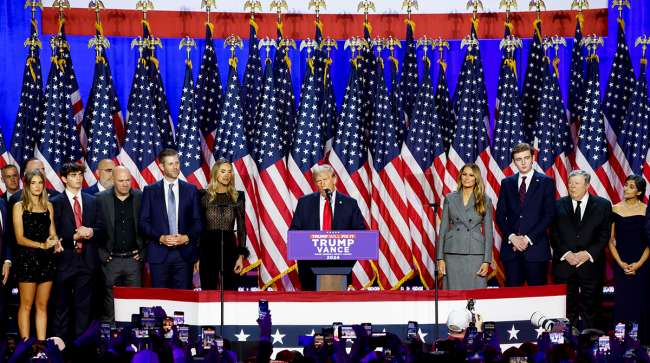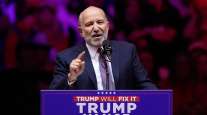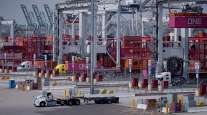Senior Reporter
Freight Industry Welcomes Trump’s White House Return

[Stay on top of transportation news: Get TTNews in your inbox.]
The return of President-elect Donald Trump to the White House is being welcomed by key freight stakeholders seeking improvements across the commercial transportation sector.
Groups representing the trucking industry, the construction sector, the business community and others have expressed optimism specific to an incoming Trump administration. Trump, who defeated Vice President Kamala Harris, will return to the Oval Office in January, eight years after the start of his first term. He joins Grover Cleveland on the list of presidents elected to nonconsecutive terms.
“We congratulate President-elect Donald Trump and Vice President-elect J.D. Vance on their victory and look forward to working with their transition team and new administration in the days and months ahead,” said American Trucking Associations President Chris Spear shortly after the election.
“President Trump made trucking a priority throughout his first term and partnered with us to enact policies that strengthened the supply chain, grew the economy, and delivered for all Americans. His second term offers an historic opportunity to build upon that record and show why the best approach to governing is one paved by common sense. That begins by replacing EPA’s electric-truck rule with national emission standards that are technologically achievable and account for the operational realities of our essential industry,” Spear added, pointing to targets set by the U.S. Environmental Protection Agency for adoption of zero-emission vehicles.
The American Trucking Associations congratulates President-elect @realDonaldTrump and Vice President-elect @JDVance on their victory.
President Trump made trucking a priority throughout his first term and partnered with us to enact policies that strengthened the supply chain,… — American Trucking (@TRUCKINGdotORG) November 6, 2024
The upcoming legislative agenda Trump will face also includes tax, labor force and civil justice system initiatives.
At the U.S. Chamber of Commerce, President and CEO Suzanne Clark emphasized the nation’s economic landscape. As she put it, “With the election behind us, it is time to focus on the important work of advancing an economic growth agenda that creates opportunities for businesses, families, and individuals to achieve the American dream.”
She continued, “We look forward to working with the Trump-Vance administration and Republicans and Democrats in Congress to preserve pro-growth tax policies, bring regulatory relief to business, harness the power of AI to drive American innovation, and expand an all-of-the-above energy production policy.”
U.S. Chamber of Commerce President and CEO Suzanne P. Clark issued the following statement on the 2024 election: pic.twitter.com/wSa0BtD3G0 — U.S. Chamber (@USChamber) November 6, 2024
National Association of Manufacturers President and CEO Jay Timmons emphasized potential updates to environmental permitting reform during Trump’s second term, as well as an enhanced focus on domestic energy. “We believe that we can build on the successes of our previous work together to roll back burdensome regulations, unleash American energy security [and] power the economy of the future,” he said.
Over the next four years, the Trump administration must set its course for the ongoing implementation of 2021’s Infrastructure Investment and Jobs Act, a legislative package aimed at a comprehensive update to the nation’s network of highways and commercial corridors.
President Trump’s first term was a historic era for manufacturing. Now, as the president-elect gears up for a second term, we look back on the transformational achievements and the NAM’s role in shaping policies that revitalized manufacturing in the U.S. https://t.co/hKIBXgNtHa — The NAM (@ShopFloorNAM) November 6, 2024
During the campaign, Trump pledged to follow through on a vast policy portfolio ranging from re-evaluating emissions reduction programs to prioritizing domestic energy production. The Trump campaign also called for reversing certain Biden-era rules and regulations that respond to climate change and prioritizing traditionally powered vehicles.
“Under President Trump, the U.S. became the No. 1 producer of oil and natural gas in the world — and we will soon be again by lifting restrictions on American energy production and terminating the socialist Green New Deal. Republicans will unleash energy production from all sources, including nuclear, to immediately slash inflation and power American homes, cars and factories with reliable, abundant and affordable energy,” according to “2024 GOP Platform: Make America Great Again!,” a document endorsed by the Trump campaign. The Green New Deal is a progressive policy platform.
Want more news? Listen to today's daily briefing above or go here for more info
With Republicans returning to the majority in the Senate next year, the Trump White House will benefit from the chamber’s support of his upcoming agenda. Sen. Ted Cruz (R-Texas), ranking member of the Commerce Committee on freight policy, was re-elected in the Lone Star State. Cruz’s role in pushing back on electric vehicles and alternative fuels policies will likely be enhanced during the next session of Congress. As a leader on the panel, Cruz pursued in-depth examinations of national aviation and freight rail operations. He also advocated for highway safety. As he said during a hearing in September: “I agree that roadway safety is an important priority — according to the National Highway Traffic Safety Administration there were almost 41,000 motor vehicle traffic fatalities last year.”
Also winning her re-election contest was Sen. Deb Fischer (R-Neb.), a longtime champion of commercial transportation policies. During this session of Congress she led the bipartisan passage of the Veteran Improvement Commercial Driver License Act. The law ensures certain veterans’ benefits are approved without delay at commercial driving schools.
Governing control of the U.S. House of Representatives was undecided as of Transport Topics’ publishing deadline. A party needs at least 218 members to declare a majority.




